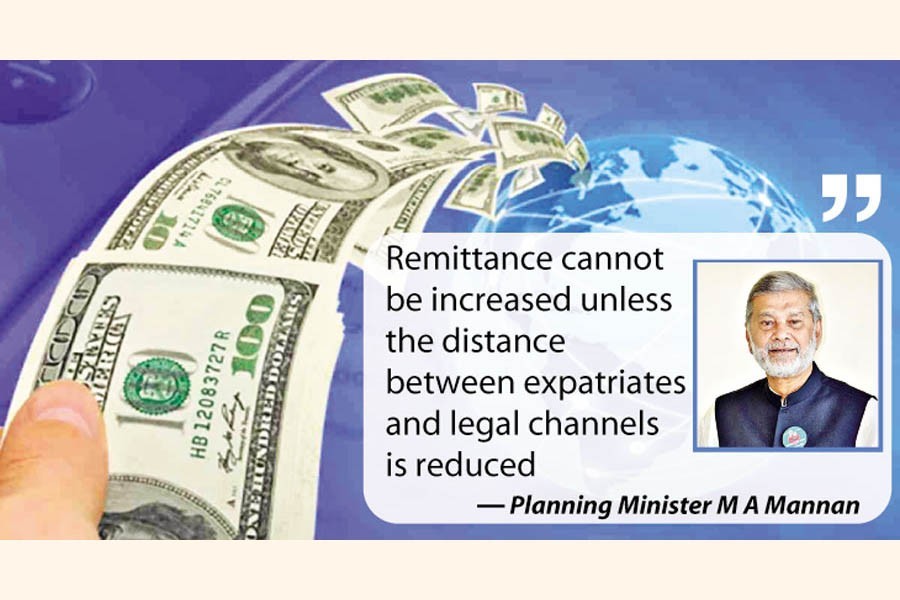
Published :
Updated :

The mobile financial services (MFS) can help stabilise the country's rapidly shrinking foreign-currency reserves by bringing more remittance through formal channel, economists and experts said on Wednesday.
So, they suggested massive promotional activities for enhancing literacy about well-secured MFS among the Bangladeshi expatriates alongside properly engaging embassy officials in the sourcing countries.
Simultaneously, they also recommended reducing the difference of dollar rates between banking system and kerb market.
The observations and suggestions came at a roundtable titled "Remittance through legal channel: prospects of digital platforms".
The Economic Reporters Forum (ERF) hosted the discussion, chaired by ERF President Sharmeen Rinvy, at its auditorium in the capital, where Planning Minister M A Mannan was present as the chief guest.
The planning minister said there is a kind of social distance among people, who receive remittance, regarding transactions by going to banks. As a result, they find it relatively easier to receive remittance from their home even via illegal channels.
"Remittance cannot be increased unless the distance between expatriates and legal channels is reduced. The government is working on it. Digital platforms can play a pivotal role in this regard."
Mr Mannan mentioned that transactions with other countries through banking channel are closed for three days a week (as Fri and Sat are the two weekly holidays here, while Sun is the weekly holiday in most other states). For this reason, 'hundi' is being preferred as a better transaction medium.
"The government wants to break these traditional barriers and start a new trend. These issues must be dealt with. The Ministry of Finance and the Bangladesh Bank are working on these," he added.
Presenting the keynote paper, Dr. Bazlul Haque Khondker, Chairman of local think-tank SANEM, said MFS, as a cost- and time-effective mechanism, can be a useful tool to further encourage remitters to send their hard-earned money through legal system.
He said there is an estimation that the amount of remittance that comes through illegal channels is equivalent to 49 per cent of the total remittance that comes through legal system here.
"It means remittance between US$10 billion and $12 billion comes through informal ways. If we can bring a portion of the foreign currencies (formally) through promoting MFS, it will be a good thing for our economy," he added.
Executive Director of Policy Research Institute (PRI) Dr. Ahsan H Mansur said the country needs to emphasise bringing more remittance in a bid to stabilise its forex reserve.
He said the reserve is getting squeezed by more than a billion dollar a month. The central bank is releasing the greenbacks in the market, and the reserve is declining.
"So, we've to increase earnings from export and remittance as well as reduce dependency on import for the sake of sustainability."
He also suggested going to the migrant workers, listen to their experiences or suggestions, and convince them to send remittance through formal channel.
Chairman of Policy Exchange of Bangladesh Dr. M Masrur Reaz said Bangladesh's import expenses historically go up by over 30 per cent than the export earnings.
With the current projections, when the nation will get upper middle-income status by 2031, its annual export will reach $99 billion and import $130 billion.
"How will we go to this level, if there is a supply dearth of enough greenbacks? So, remittance is the biggest area, where we have to look at very seriously."
Talking about MFS, he noted that Bangladesh introduced MFS in bringing remittance after India and Sri Lanka in the region. But Bangladesh managed to fetch 1.4 per cent of the total remittance through the digital platform in 2021, whereas the rates were 1.37 per cent and 0.8 per cent in India and Sri Lanka respectively.
"If we can give more attention to MFS, we can possibly bring a good share of the illegally sent remittance through formal ways," he added.
Md Iskandar Mia, former deputy head of Bangladesh Financial Intelligence Unit (BFIU), said necessary initiatives should be taken to bring remittance of the illegal migrant workers through legal channel.
"For that, engaging MFS agents can be a solution. It is also important to take steps to stop money laundering," he added.
Sheikh Md Monirul Islam, Chief External and Corporate Affairs Officer of bKash, said the MFS received $243 million of remittance in 2021. In the first nine months of this calendar year, the volume rose to $307 million.
In the first eight days of November, bKash received remittance amounting to $12 million. "We're expecting that the volume will reach $400 million in 2022. So, the growth will be around 64 per cent."
Focusing on digital literacy, he said more remittances are coming from the western countries, where digital literacy and practices are quite higher.
Mohammed Monirul Moula, Managing Director and Chief Executive Officer of Bangladesh Islami Bank Limited, opined that if the problems of sending remittance by the expatriate workers are addressed, it would be easier to deal with the country's existing challenges in terms of foreign reserve.
Professor of Economics at Jahangirnagar University Sormindo Nilormi, Emeritus Fellow of Unnayan Samannay Khondakar Sakhawat Ali, and ERF General Secretary S M Rashidul Islam also spoke at the discussion.


 For all latest news, follow The Financial Express Google News channel.
For all latest news, follow The Financial Express Google News channel.